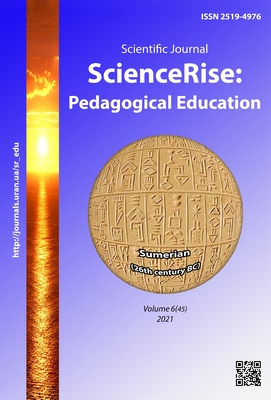«Individual curriculum» as a way of planning by students of vocational and technical education of their employment
DOI:
https://doi.org/10.15587/2519-4984.2021.248072Keywords:
individual curriculum, vocational education, students, methodology, questionnaire, training, work, career, education, employmentAbstract
The article deals with the problem of student’s employment in the specialty of graduation at vocational education institutions. Considering the plans of some students on relearning or developing new skills in courses or internships, they need awareness of right specialty to choose and job preferably to find after graduation. The paper considers the relevant issue of research and development of individual planning methods for vocational education students in terms of their employment. The emphasis is made on this factor impact for future employment, namely its impact on the individual professional orientation and career, which can be planned through an individual curriculum i.e. balanced life planning.
An individual curriculum is a set of activities that help taking responsibility for the future by combining educational activities at school, college, work and in general throughout the career. It determines the sequence, form and pace of mastering the educational program components, own experience and other successful experiences, methods and activities necessary for achievement of the main planning goal. An individual plan is important as planning efficiently turns knowledge into skills.
The study considered based upon the "Individual curriculum" method and auxiliary test methods: "Success motivation and failure fear (questionnaire by Rean A.O.)", a test to determine the motive for a profession choice – the method of professional self-determination by J. Holland.
The research was implemented on the basis of the Sumy Chemical-Technological Center for Vocational Education, consisting of two stages of online testing with further explanation to students and their individual curricula development.
The first research stage involved students’ participation in an online quest, tests performance and obtaining explanations based on the methods of comprehensive interpretation.
The second research stage involved the method of "individual curriculum planning" based on a plan template according to the study year.
References
- Osvitnia reforma: rezultaty ta perspektyvy (2019). Kyiv. Available at: https://mon.gov.ua/storage/app/media/Serpneva%20conferentcia/2019/Presentacii/Institut-zbirnik.pdf
- Dokuchyna, T. O. (2011). Motyvatsiia navchannia yak zaporuka stymuliuvannia uchniv do dosiahnennia uspikhu. Pedahohichna osvita: teoriia i praktyka, 8, 32–37. Available at: http://nbuv.gov.ua/UJRN/znppo_2011_8_7
- Nezhdanova, N. V. (2015). The empirical analysis of the dynamics of motivation of future specialists as an important component of the structure of their professional qualities. Visnyk Odeskoho natsionalnoho universytetu. Seriia: Psykholohiia, 20 (3 (1)), 71–81. Available at: http://nbuv.gov.ua/UJRN/Vonu_psi_2015_20_3%281%29__10
- Kalinichenko, A. V. (2013). Motivation and motivational process: the nature and concept. Visnyk ekonomiky transportu i promyslovosti, 42, 417–420. Available at: http://nbuv.gov.ua/UJRN/Vetp_2013_42_72
- Habenko, I. M. (2021). Doslidzhennia perspektyv realizatsii indyvidualnoi osvitnoi traiektorii zdobuvacha vyshchoi osvity. Teoriia i metodyka profesiinoi osvity, 2 (34), 37–40.
- Bachke, C. C. (2015). Individualized Education Plans: What Characterizes the Research? Society, Integration, Education. Proceedings of the International Scientific Conference, 3, 31–44. doi: http://doi.org/10.17770/sie2015vol3.389
- Kozlov, N. I. (2015). Planuvannia zhyttia. Psykholohis. Entsyklopediia praktychnoi psykholohii. Available at: http://psychologis.com.ua/planirovanie_zhizni.htm
- Bogachkov, Y. M., Mylashenko, V. M., Ukhan, P. S., Sagadinа, O. Y. (2018). ICT instruments for designing individual education path for high school students. Information Technologies and Learning Tools, 64 (2), 23–38. doi: http://doi.org/10.33407/itlt.v64i2.2164
- Pro osvitu (2017). Zakon Ukrainy No. 2145-VIII. 05.09.2017. Available at:
- http://ru.osvita.ua/legislation/law/2231/
- Individualized Learning Plan – About. U.S. Department of Labor. Available at: https://www.dol.gov/agencies/odep/program-areas/individuals/youth/individualized-learning-plan
- Motyvatsiia uspikhu ta boiazn nevdachi (opytuvalnyk Reana A. O.). Available at: http://testoteka.narod.ru/ms/1/08.html
- Test «Motyvy vyboru profesii». Available at: https://www.bdut.org.ua/proforijentacija/motyvy-vyboru-profesiji/test-motyvy-vyboru-profesiji/
- Test Dzh. Hollanda dlia vyznachennia profesiinykh typiv osobystosti. Available at: http://proforientator.info/?page_id=6016
Downloads
Published
How to Cite
Issue
Section
License
Copyright (c) 2021 Sergii Korol, Anna Zinchenko, Karina Hlushchenko

This work is licensed under a Creative Commons Attribution 4.0 International License.
Our journal abides by the Creative Commons CC BY copyright rights and permissions for open access journals.
Authors, who are published in this journal, agree to the following conditions:
1. The authors reserve the right to authorship of the work and pass the first publication right of this work to the journal under the terms of a Creative Commons CC BY, which allows others to freely distribute the published research with the obligatory reference to the authors of the original work and the first publication of the work in this journal.
2. The authors have the right to conclude separate supplement agreements that relate to non-exclusive work distribution in the form in which it has been published by the journal (for example, to upload the work to the online storage of the journal or publish it as part of a monograph), provided that the reference to the first publication of the work in this journal is included.








